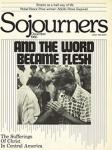On the morning of October 13, 1980, a telegram marked urgent arrived unexpectedly at the door of Adolfo Perez Esquivel's small office in Buenos Aires, Argentina, informing him that he had just been awarded the Nobel Peace Prize for 1980.
The award caught everyone off-guard, especially the Argentine military junta. Esquivel has been an industrious human rights activist and ardent practitioner and advocate of nonviolence in the service of justice for the poor and oppressed throughout Latin America. He was chosen over 70 other nominees, including President Carter and Pope John Paul II. Before this, the nature of Esquivel's work usually has gotten him into situations of disfavor rather than acclaim.
The Nobel citation said that the 48-year-old Esquivel has "shone a light in the darkness. He champions a solution of Argentina's grievous problems that dispenses with the use of violence, and is the spokesman of a revival of respect of human rights....The views he represents carry a vital message to many other countries...where social and political problems, as yet unresolved, have resulted in an escalation of the use of violence."
Esquivel, head of a growing network of nonviolent workers in Latin America called the Service for Peace and Justice (SPJ), received the news with a calm, humble grace that has marked his life and work.
"I accept this prize in the name of Latin America and its workers," he said, "in the name of its campesinos and its priests who are working diligently for the peace and rights of all." He announced that he would donate the $212,000 award money to the work of SPJ.
Esquivel has coordinated the network's efforts since 1974. Its nonviolent tactics have included work stoppages, vigils, petitions, fasts, and other public demonstrations, and have in many instances resulted in measurable successes.
Esquivel is a realistic idealist who has paid a heavy price for his beliefs. His life shatters the myth that nonviolence is an impotent response to injustice. He has been imprisoned repeatedly, tortured brutally, and in general hounded for his nonviolent human rights work that has threatened repressive regimes and corporations. Many believe Esquivel's life was spared during his most recent 14-month imprisonment in Argentina by the active international campaign waged by human rights groups and churches who pressed for his release, and because of his nomination for the Nobel prize.
Although prison was very difficult, he wrote soon afterward that "it was a very strong and intense experience to live in constant prayer, with that freedom of the spirit which cannot be locked up in any prison, which transcends, which guides and strengthens us in the most critical conditions when one stops being a person and is made into a number. When the Gospel is prohibited, it is necessary to return to oneself to find the inner life that allows us to make of 'the Desert' a place in which to meet Christ."
In October, the censored newspapers in Argentina headlined the news of the Peace Prize award, but they emphasized Esquivel's artistic accomplishments, barely mentioning the human rights work for which he received the prize.
Esquivel is renowned in Argentina as a sculptor and architect. In the city of Azul stands his noted "Monument to a Mother." Years ago, he explained the synthesis of his art and human rights work: "I feel that my style is affirming itself in this suffering America; I am part of its joys and sorrows, of its fears and hopes."
During the 1970s, Esquivel the artist gradually began to devote more and more time to the human rights movement. In 1971, he helped found a Gandhian artisans' workshop that based its life on the Gospels. In 1972, he engaged in a large public hunger strike to protest the mounting violence. The following year, he helped start a human rights organization in Argentina, and in 1974 he was instrumental in establishing the Service for Peace and Justice.
In Argentina today, Esquivel continues to publicly condemn the military junta for the estimated 10,000 to 20,000 people who have "disappeared" at the hands of government forces since 1976. He works closely with the "mothers of the Plaza de Mayo," who regularly vigil in front of the presidential palace on behalf of their missing children.
Esquivel intends to travel from Argentina to Oslo, Norway, to receive his prize on December 10. But his life is still in danger, even with the world attention that the Nobel prize has attracted. The Argentine military has been embarrassed by the award. Ironically, under Argentine law, the government promises all Argentine Nobel winners a lifetime pension of more than $5,000 a month. Even before the award was made, extremist groups were circulating vicious rumors that Esquivel's friends fear might incite a right-wing terrorist assassination attempt against his life.
"Instead of talking of [my] problems," Adolfo Esquivel said on the day he won the Peace Prize, "I rather speak of hope. It gives me energy to go ahead."
Phil M. Shenk was on the editorial staff at Sojourners when this article appeared.

Got something to say about what you're reading? We value your feedback!
